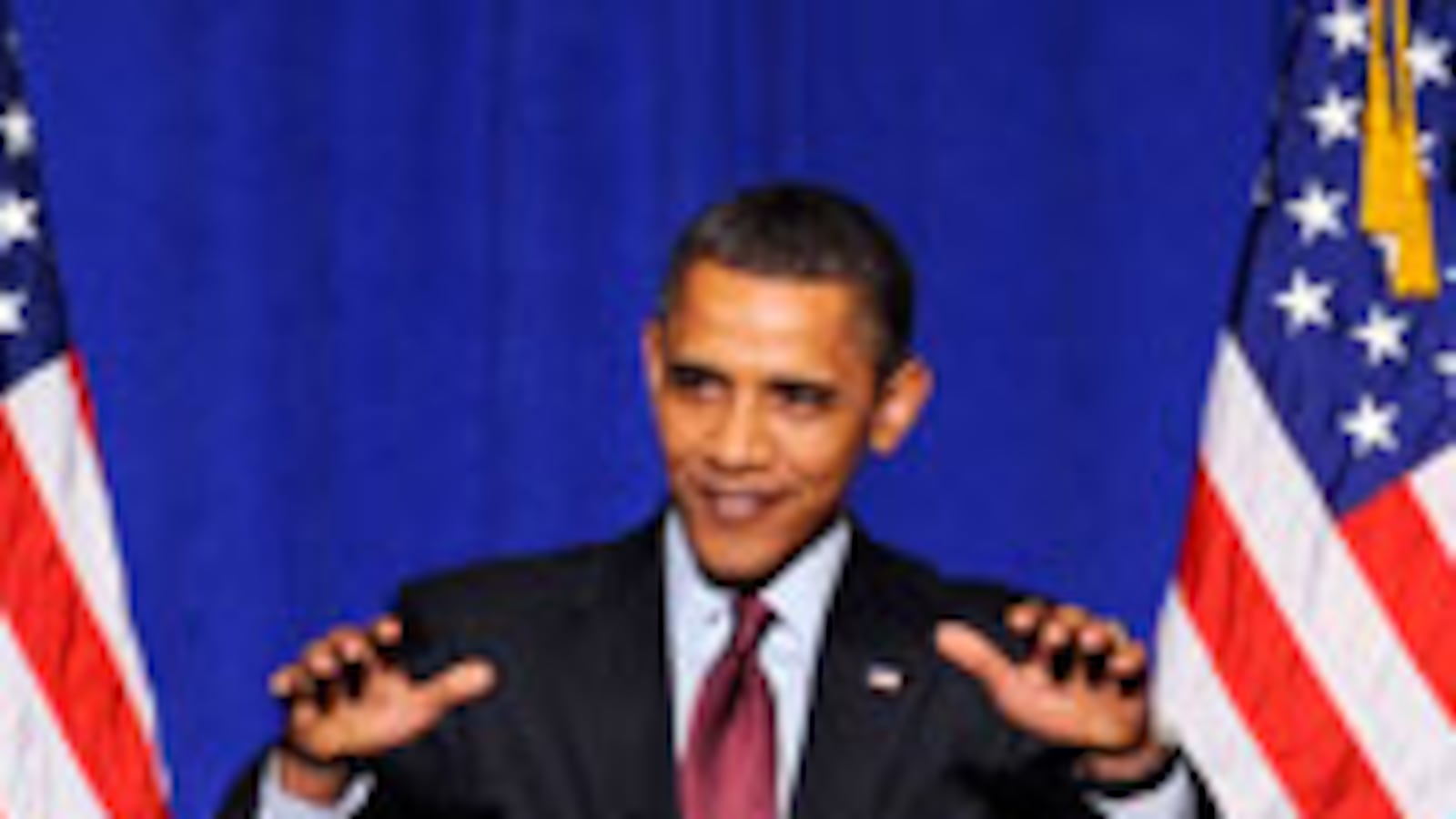
It may be hard to find an optimist inside the West Wing about the Democrats' chances in November's midterm elections. But there is a growing consensus among Obama's senior staff that the best strategy for the fall is to argue Republicans should be just as worried as the Democrats are.
Voters are lashing out at incumbents of both parties—which comes as a comfort to a White House braced for a Republican tidal wave this fall. And the president's political operatives aren't missing the chance to play up that message as they head into the biggest primaries of the midterm season thus far this Tuesday.
“It’s a weird environment. The real divide isn’t between Republicans and Democrats,” says a senior Obama adviser. “It’s America and Washington.”
In particular, Obama's aides point to the recent GOP results in Indiana as a sign that voter unrest may take as much of a toll on Republicans as Democrats. Barack Obama won the state for the Democrats for the first time since Lyndon Johnson in 1964, albeit by less than 1 percentage point.
"Dan Burton got less than 30 percent of the vote and the only reason he survived is because there were six people in the race with him," said one senior Obama aide. "Dan Coats was the choice of the party and a former United States senator and he barely got 40 percent of the vote. The Republican Party is in fact marginally less popular than the Democrats."
• Tunku Varadarajan: Expect a Political Cleansing During the Primary• Big Fat Story: The 4 Biggest Midterm BattlesCoats, a former lobbyist, won against four other candidates, who split the vote in his Senate primary race. Burton, a 14-term congressman in Indiana's 5th District, won by just 2 points in a field crowded with anti-Washington conservatives. "I think there's a lot of disenchantment with Washington in general and there's no question there's an awful lot of people out there who are just saying, 'My Gosh, let's blame them all and throw them all out,'" Burton told the Indianapolis Star.
Inside the White House, Obama's advisers see a similar dynamic across the country.
"I think a lot of it is going to be hand-to-hand combat," said the senior Obama aide. "It's a weird environment. The real divide isn't between Republicans and Democrats. It's America and Washington. This is a continuation of the last election. But as the party in power, we are more vulnerable."
As the party in power, the White House also faces more complex challenges as it approaches the midterms. Pennsylvania's Senate race exemplifies the tensions for the president and his senior advisers.
On one hand, they desperately need the vote of incumbent Senator Arlen Specter as they try to complete big legislation—on financial reform, as well as energy and climate change—given the size of their current majorities in Congress.
But they also know that Specter is polling worse than his Democratic rival Joe Sestak in a general election matchup against Republican Pat Toomey. Specter trails Toomey by 2 to 12 points, while Sestak trails the Republican by between 2 and 5 points in this month's polling.
In private, senior White House officials say that Specter can pull off a surprise win over Sestak on Tuesday, based on confident predictions by Pennsylvania Governor Ed Rendell—the man who helped engineer Obama's big defeat in the Pennsylvania primary two years ago. "Rendell says Specter will win and win comfortably," says another senior aide. "And I never bet against Rendell."
There is an additional reason why the White House is reluctant to express in public anything remotely resembling criticism of an incumbent Democrat facing a primary challenge: New York Governor David Paterson. Obama's aides pressured a weakened Paterson to back out of his election bid last fall (the governor had ascended to the job when incumbent Eliot Spitzer was forced to resign). But their efforts only strengthened Paterson's hand—and created the impression that the White House was overplaying its hand by delving into Democratic primary politics. Paterson later dropped out of the race in the aftermath of a domestic-violence scandal surrounding a longtime aide. But nobody seemed inclined to give Obama's team credit for being prescient.
Another example of the complex local politics of 2010: Nevada, where Majority Leader Harry Reid is welcoming third-party candidates into his own race. His strategy, embraced by Obama's aides, is to split the conservative anti-Washington vote. However recent polling in Nevada suggests a third-party candidate would lure votes away from both main parties in equal measure, and in small numbers. And whether an Obama appearance in support of the Senate majority leader would help or hurt Reid's chances of reelection remained unclear.
The widespread dissatisfaction with both main parties was clear in a new NBC News/Wall Street Journal poll out last week. More than 80 percent said there were problems with the two-party system, and 31 percent wanted to see a third party emerge.
The same poll showed Obama's presidential approval ratings rise to 50 percent. In general, the Democratic Party earned positive ratings from just 37 percent, while the Republicans won positive ratings from 30 percent. That was 1 point less than the Tea Party movement. When asked which party should control Congress, voters put both parties at 44 points. In the last two cycles, Democrats enjoyed double-digit leads on the same question.
White House aides say President Obama will travel extensively for congressional candidates in the fall, but say it is too early to know where exactly they'll send him. Their preference is to travel as widely as possible, given that he remains far more popular than his party and that the results will inevitably be seen as a judgment in part on his own performance.
For now, they are focused on using the president's formidable fundraising power to help even the playing field in a difficult year for his own party's candidates. Obama raised $1.3 million from a single dinner event at the St. Regis hotel in Manhattan on Thursday evening for Democratic congressional candidates, including some two dozen members of Congress who attended the dinner itself.
Richard Wolffe is Daily Beast columnist and an award-winning journalist. He covered the entire length of Barack Obama's presidential campaign for Newsweek magazine. His book, Renegade: The Making of a President, was published by Crown in June.






